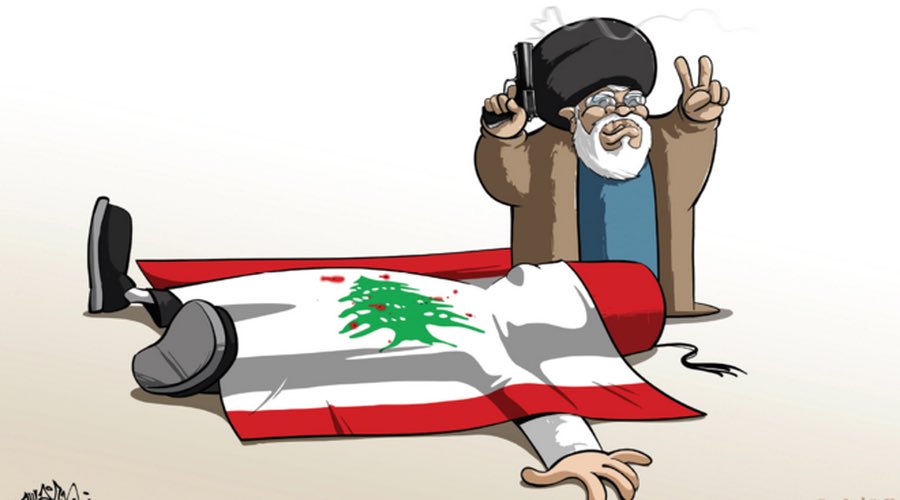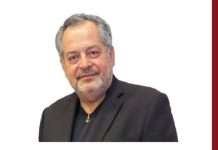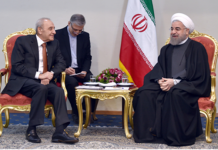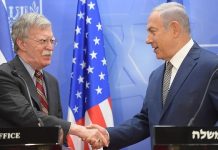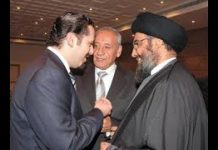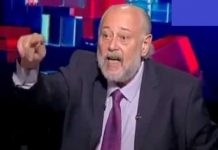Lebanese Democracy Under the Shadow of Hezbollah
Elias Harfoush/Ashark Al Awsat/April, 08/2022
الديمقراطية اللبنانية في ظل «حزب الله»!
الياس حرفوش/الشرق الأوسط/08 نيسان/2022
تنتشر اليافطات الانتخابية في لبنان لقوى المعارضة، تحمل الشعارات التي تعارض الوضع التعيس وتعد بالقدرة على تغييره. وتسأل نفسك أمام هذه الشعارات: علامَ يعتمد هؤلاء الحالمون في بلد دفعه الشلل السياسي والأزمة الاقتصادية الطاحنة إلى الحضيض أو إلى ما دونه؟ وهل لا تزال فرص الإنقاذ ممكنة، فيما القوة النافذة في لبنان، وهي قوة «حزب الله»، لا ترد على معارضيها إلا بلغة التخوين، وتتهمهم بأنهم «عملاء للسفارات» وأدوات في خدمة المشروع المناهض لهذا الحزب؟
لا شك أن القوى المشاركة في الانتخابات تحتاج إلى شعارات لحشد التأييد الشعبي. ولأن القدرة على رفع الشعار أسهل من القدرة على تحقيقه، سوف تنتهي هذه الانتخابات إلى أن هناك مَن سيحققون ما يريدون، وسوف يكون هناك مَن يفشلون، تبعاً لموازين القوى ولقدرة كل فريق على تأمين التأييد الشعبي لشعاراته.
الرهانات كثيرة على نتائج الانتخابات التي يفترض أن تجري في منتصف الشهر المقبل. فريق السلطة الحاكم (والأصح المهيمن) الذي يضم تجمعاً يشمل «حزب الله» ومعاونيه من مختلف الاتجاهات، يقول إنه يحظى بأوسع تحالفات عابرة للطوائف والمناطق. بين القوى الحليفة لهذا الحزب: «التيار الوطني الحر» وحركة «أمل» وأحزاب «ممانعة»، بعثية وقومية. هذا الفريق يخوض المعركة، التي يعتبرها «معركة وجود»، في وجه مطالب التغيير تحت ضغط الانهيار الشامل. ويهدف هذا الفريق إلى الحفاظ على مكتسبات السنوات الماضية، التي حققها بأدوات التعطيل والترهيب. وهو يستخدم في حملته الانتخابية خطاب التحريض المذهبي والتهويل السياسي، متهماً خصومه بأنهم أدوات لما يسميه «المشروع الأميركي»، وبأن تمويل معركتهم يأتي من السفارات التي تريد ضرب المقاومة والحد من قدراتها. ويدعو مناصريه إلى الإقبال على صناديق الاقتراع انطلاقاً من أنه «أمر جهادي وفرصة عبادية». ويصرح رئيس كتلته النيابية النائب محمد رعد بأن معارضيه يهدفون إلى الحصول على أكثرية نيابية تسمح لهم بأن يأتوا برئيس للجمهورية في انتخابات الخريف المقبل، لينفذ السياسة الأميركية في لبنان. ويضيف رعد مهدداً: نحن ضد ذلك وسنمنع هذا الأمر. ولا يتردد في التأكيد أن «حزب الله» وحركة «أمل» سيحصلان على كل المقاعد المخصصة للطائفة الشيعية في البرلمان المقبل (27 نائباً شيعياً)، في إشارة من السيد رعد إلى أن فهمه للعملية الديمقراطية هو أن إعلان النتائج يتم حتى قبل إجراء الانتخابات!
على الضفة الأخرى، هناك من يحلم بالقدرة على تغيير الوضع، انطلاقاً من أن معظم اللبنانيين الذين يعانون من الظروف المعيشية والاقتصادية القاسية سوف يميلون إلى تحميل المسؤولية لمن قادوا البلد إلى هذا الوضع وسوف يحسن الناخبون بالتالي اختيار البديل.
القوى «التغييرية» التي انطلقت مما سُمي انتفاضة أكتوبر (تشرين الأول) 2019 قوى مشرذمة لم تستطع أن تتوحد حول مشروع واحد أو لوائح مشتركة. وهناك تكتل من مختلف الطوائف، يضم أحزاباً تسعى إلى التغيير، مثل «القوات اللبنانية» و«الاشتراكي» والكتائب، وقيادات سنية مناوئة لهيمنة «حزب الله» يمتد تمثيلها إلى مختلف المناطق، وتحاول ملء الفراغ الذي تركه امتناع سعد الحريري وتيار «المستقبل» عن خوض الانتخابات. من الشعارات التي رفعها حزب «القوات» مثلاً باللغة اللبنانية المباشرة: «نحنا بدنا ونحنا فينا»، في إشارة إلى رغبتهم في إحداث التغيير وقدرتهم على ذلك.
يطالب التجمع الذي يضم هذه القوى باستعادة الدولة لقدرتها على اتخاذ قراراتها السياسية والأمنية ورسم سياستها الخارجية، بعدما تمكن «حزب الله» من السيطرة على مراكز القرار، بدءاً من رئاسة الجمهورية وأكثر الوزارات. ويرى أن ذلك هو المدخل الصحيح لتتمكن الدولة من إدارة شؤونها السياسية والمالية. وقد عبر المفتي الشيخ عبد اللطيف دريان عن دعمه لهذا المطلب في رسالته بمناسبة بدء شهر رمضان، وقال إن هذه الانتخابات تضاهي في أهميتها شعار «لبنان أولاً» الذي رفعته الأحزاب المعارضة لهيمنة «حزب الله» وللنفوذ السوري، بعد اغتيال الرئيس رفيق الحريري، فيما عرف آنذاك بقوى «14 آذار». وأضاف المفتي دريان: هذا الشعار الذي نادينا به كانت له الأولوية ولا تزال. كما انتقد ما وصفه بـ«الهدم الفظيع لعلاقات لبنان العربية والدولية والمحاولات البائسة للتعرض لهوية لبنان وانتمائه». وهاجم «إسقاط حرمات المؤسسة العسكرية وصلاحياتها والأجهزة المسلحة لصالح ميليشيا بل ميليشيات خاصة تأتمر بأوامر الخارج».
الأصوات المعارضة لـ«حزب الله» هي من دون شك أكثر ارتفاعاً هذه المرة من أي انتخابات سابقة، والاتهامات تتجه إلى الحزب وحلفائه، خصوصاً «التيار الوطني الحر» باعتباره في موقع المسؤولية الأولى، من خلال رئاسة الجمهورية. ولأن الحزب أخذ يشعر بوطأة الاتهامات وبصعوبات الوضع المعيشي، فقد تحولت حملاته المضادة إلى اتهام خصومه بـ«العمالة» وبالحصول على الأموال من الخارج لكسب المعركة. الرئيس نبيه بري قال مثلاً إن خصومه ينفقون 30 مليون دولار لمحاولة إسقاطه في دائرته الانتخابية.
في هذا المناخ، ولأن القوى المعارضة لـ«الثنائي الشيعي» عاجزة عن خوض حملاتها في مناطق نفوذه، حيث تم تسجيل أقل عدد من اللوائح ومن المرشحين، تصبح نتائج الممارسة الديمقراطية محسومة سلفاً، مثلما توقع النائب محمد رعد. كما يصبح مطلب التغيير مطلباً عبثياً. فالقوى التي تطالب به عاجزة عن تحقيقه، والقوى الرافضة والمستفيدة من الوضع الحالي قادرة على فرض إرادتها بالقوة، سواء من داخل صناديق الاقتراع أو من خارجها، كما أثبتت تجارب انتخابات عامي 2005 و2009 عندما كسب الفريق المعارض لـ«حزب الله» الأكثرية ومُنع من الحكم. أو كما يحصل في العراق حيث نجح معارضو القوى الحليفة لإيران في كسب الأكثرية في الانتخابات الأخيرة ولم يتمكنوا من ترجمة ذلك في مقاعد السلطة.
وللذين يراهنون على نتائج الانتخابات، وجه النائب محمد رعد نصيحته: على الذين يفكرون في أن يحكموا بأكثرية جديدة أن يفهموا أن لا أكثرية تستطيع أن تحكم في لبنان.
Lebanese Democracy Under the Shadow of Hezbollah
Elias Harfoush/Ashark Al Awsat/April, 08/2022
Electoral campaign banners and billboards erected by opposition parties have been spreading across Lebanon, denouncing the wretched state of the country and promising change. Looking at these slogans, you ask yourself: What are these dreamers betting on in a country that has been at rock bottom by political paralysis and the severe economic crisis? Is there still a chance to save the country while the faction that calls the shots in Lebanon, Hezbollah, continues to respond to opponents with accusations of treachery and being “operatives working for embassies” and tools in the service of the plot against the party?
All the political forces taking part in the election need slogans to mobilize popular support. Because slogans are easier to say than act on, these elections will leave some achieving what they had set out to achieve and others who fail, depending on the balances of power and each team’s ability to garner support for their slogans.
A lot is at stake in the elections scheduled for the middle of next month. The ruling powers (or rather the hegemonic powers), an alliance that brings together Hezbollah and its helpers of various inclinations, say they have the broadest cross-sectarian and regional alliance competing in these elections. Among the forces allied to this party are the Free Patriotic Movement, the Amal movement, and the Baathist and Nationalist parties tied to the axis of resistance. This team is fighting a battle that it considers existential against demands for change born out of the weight of the total collapse.
This team seeks to maintain the gains it has made over the past few years through disruption and intimidation. Its electoral campaign is ridden with sectarian incitement and political hysteria, as it accuses opponents of being operatives working to advance an “American project” and claims that their campaigns are funded by foreign embassies seeking to undermine the resistance. The campaign seeks to compel supporters to turn out to the polls on the grounds that it is “an obligation of Jihad and an opportunity to demonstrate religious devotion.”
The deputy who heads Hezbollah’s parliamentary bloc, Mohammad Raad, warns that his opponents are hoping for a parliamentary majority that would allow them to choose the president once the incumbent’s term ends next fall, in order to see the policies sought by the US implemented in Lebanon. Raad also ominously added: We are against it, and we will prevent this from happening. He does not shy away from confirming that Hezbollah and the Amal Movement will win every seat allocated to the Shiite sect (27 Shiite deputies), which demonstrates how Mr. Raad understands the democratic process, the results of which he seems to think are announced before the elections are even held!
On the opposite corner, we have those dreaming of the ability to change things. Their aspirations are founded on the conviction that since the majority of Lebanese are struggling with the difficult, harsh living conditions in the country, they will generally hold those responsible for this state of affairs accountable, and the electorate will thus make the right choice and choose an alternative.
The “forces of change” that emerged from the so-called uprising of October 2019 are fragmented and could not unite around a single project or electoral list. There is a cross-sectarian bloc of parties seeking change that includes the Lebanese Forces, the Progressive Socialist Party, the Kataeb Party, and Sunni leaders, whose supporters are scattered across a variety of regions. They are opposed to the hegemony of Hezbollah and are trying to fill the void left by the decision of Saad Hariri and the Future Movement to abstain from taking part in elections. Among the slogans raised by the Lebanese Forces, for example, “We want to and we can,” which has been written in plain Lebanese dialect on billboards across the country, suggests their desire for change and their ability to do so.
The grouping that brings these forces together is calling for the state to regain its ability to take political and security decisions and formulate its foreign policy after Hezbollah had managed to control its centers of gravity, starting with the presidency and most ministries. It believes that this is the correct approach leaving the state in a position to manage its political and financial affairs.
The Grand Mufti of Lebanon, Sheikh Abdel Latif Derian, expressed his support for this demand in the message he delivered to mark the start of the month of Ramadan. He said that these elections are as important as the “Lebanon first” slogan that had been raised by the parties opposed to Hezbollah’s hegemony and Syrian influence in the aftermath of Prime Minister Rafik Hariri’s assassination, when the March 14 alliance was in power.
Derian added that “this slogan that we had advocated was and remains the priority.” He also criticized what he described as “the horrifying deterioration of Lebanon’s Arab and international relations and the wretched attempts to undermine Lebanon’s identity and position,” before decrying the marginalization of the military institution and security services in favor of a militia- or rather private militias- that follow foreign dictates.
Opposition to Hezbollah has undoubtedly been louder than it had been during any of the previous elections held in Lebanon, and fingers are being pointed at both the Party and its allies, especially the Free Patriotic Movement, which is considered to bear primary responsibility because it holds the presidency.
Because the Party has begun feeling the weight of these accusations and the country’s difficult economic conditions, its counter campaigns have become attempts to paint its rivals as “traitors” being funded from abroad. Speaker Nabih Berri, for example, claimed that his rivals had allocated 30 million dollars to their drive to unseat him in his district. In light of this climate, and given the fact that forces opposed to the “Shiite duo” are incapable of competing in the districts it controls, which have the lowest number of electoral lists and candidates, the outcome of the democratic process can be determined, as Mohammad Raad had done, before the elections are held. Demands for change become futile as well. The forces calling for change are unable to achieve it, and the forces opposing it and benefiting from the status quo have the capacity to impose their will by force, whether at the ballot box or outside it. Moreover, in the 2005 and 2009 elections, the team opposed to Hezbollah won but was prevented from governing. The same is happening in Iraq, where those opposed to Iranian loyalists won the majority of parliamentary seats but have not been allowed to use that majority to occupy seats of power.
Mohammad Raad gave a piece of advice to those betting on turning things around through elections: those thinking of ruling the country with a new majority should understand that no majority can govern Lebanon.
















